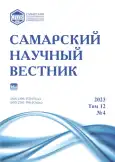Продвижение русского языка в системе образования Танзании: предпосылки, востребованность, «дефициты» и потенциальные «точки роста»
- Авторы: Бакулина С.Ю.1, Бондарева В.В.1, Позднякова О.К.1
-
Учреждения:
- Самарский государственный социально-педагогический университет
- Выпуск: Том 12, № 4 (2023)
- Страницы: 181-188
- Раздел: Педагогические науки
- URL: https://bakhtiniada.ru/2309-4370/article/view/260656
- DOI: https://doi.org/10.55355/snv2023124301
- ID: 260656
Цитировать
Полный текст
Аннотация
В статье анализируются программные документы, регламентирующие функционирование системы образования Танзании, рассматриваются социально-экономические факторы, влияющие на ее развитие, анализируется языковая политика, а также государственная политика Правительства Объединенной Республики Танзания в области образования, которое рассматривается как стратегический фактор трансформации менталитета и создания хорошо образованной нации, в достаточной степени обладающей знаниями, необходимыми для компетентного и конкурентоспособного решения задач, стоящих перед страной. Выявляются цели, стоящие перед системой образования Танзании, направленные на содействие всеобщей доступности качественного базового образования, включая дошкольное, начальное и среднее образование; искоренение неграмотности; распространение качественного высшего образования, обеспечивающего подготовку высококвалифицированных кадров, необходимых для эффективного развития всех секторов экономики. Определяются проблемы, с которыми сталкивается система образования Танзании, способы их решения и перспективы развития. Детально описывается деятельность Представительства Федерального агентства по делам Содружества Независимых Государств, соотечественников, проживающих за рубежом, и по международному гуманитарному сотрудничеству, являющегося координатором продвижения русского языка и культуры на территории Танзании. Выявляются факторы, влияющие на востребованность русского языка, повышение мотивации к его изучению, на формирование положительного образа России в сознании танзанийцев и спрос на российское образование в целом среди молодежи Танзании. Определяются предпосылки, «дефициты» и потенциальные «точки роста» продвижения русского языка в системе образования Танзании. Приводятся результаты анкетирования, проведенного в ходе официального визита делегации СГСПУ в Танзанию, определившие дальнейшие перспективы исследования, результатом которого станет модульная программа подготовки учителя русского языка как иностранного для образовательных организаций Танзании в системе российского непрерывного педагогического образования, включающая многоуровневые программы по русскому языку как иностранному, программы бакалавриата, магистратуры по русскому языку и методике его преподавания и программы повышения квалификации для учителей русского языка.
Полный текст
Открыть статью на сайте журналаОб авторах
Светлана Юрьевна Бакулина
Самарский государственный социально-педагогический университет
Email: bakulina@sgspu.ru
кандидат культурологии, исполняющий обязанности ректора, доцент кафедры педагогики и психологии
Россия, г. СамараВалерия Витальевна Бондарева
Самарский государственный социально-педагогический университет
Email: bondareva@sgspu.ru
кандидат педагогических наук, доцент, начальник международного отдела, доцент кафедры иностранных языков
Россия, г. СамараОксана Константиновна Позднякова
Самарский государственный социально-педагогический университет
Автор, ответственный за переписку.
Email: oksana.pozdnyakova@sgspu.ru
доктор педагогических наук, профессор, член-корреспондент Российской академии образования, профессор кафедры педагогики и психологии
Россия, г. СамараСписок литературы
- The education policy act, 1995 [Internet] // Parliament of the United Republic of Tanzania. https://www.parliament.go.tz/polis/uploads/bills/acts/1566634292-The%20Education%20(Amendment)%20Act,%20-1995.pdf.
- Constitution of the United Republic of Tanzania. 1977. 89 p.
- Partnership Compact 2021/22-2025/26. Towards improved inclusive student based teaching for quality learning. 2022. 57 p.
- Education and training policy. Tanzania, 2014. 70 p.
- Tanzania to increase free education budget for primary, secondary schools [Internet] // https://english.news.cn/africa/20230415/a9e16be832f04718b6ae7794375c884a/c.html.
- The Tanzania development vision 2025 [Internet] // UNESCO. https://en.unesco.org/creativity/sites/creativity/files/qpr/vision2025.pdf.
- Education sector development plan 2016/17–2020/21. 2019. 246 p.
- Танзания [Электронный ресурс] // Knoema. https://ru.knoema.com/atlas/Танзания/topics/Образование.
- Ответы на пять вопросов о наименее развитых странах [Электронный ресурс] // Организация объединенных наций. https://news.un.org/ru/story/2023/03/1438177.
- The impact of language policy and practice on children’s learning in Tanzania [Internet] // UNICEF. https://www.unicef.org/esa/sites/unicef.org.esa/files/2018-09/unicef-2017-language-and-learning-tanzania.pdf.
- National curriculum framework for basic and teacher education. 2019. 100 p.
- EAC Integration Education Act, 2019 [Internet] // https://www.eala.org/documents/view/eac-integration-education-act-2019.
- Curriculum for Primary Education Standard I–VII. 2019. 72 p.
- Пресс-конференция Владимира Путина по итогам саммита Россия – Африка [Электронный ресурс] // Известия. https://iz.ru/1551548/2023-07-30/press-konferentciia-vladimira-putina-po-itogam-sammita-rossiia-afrika-glavnoe.
- Why Russia relations vital for Tanzania economic growth [Internet] // Daily News. https://dailynews.co.tz/why-russia-relations-vital-for-tanzania-economic-growth.
- Russia-African Summit: Expectations and its impacts on the Tanzanian – Russian relationship [Internet] // Daily News. https://dailynews.co.tz/russia-african-summit-expectations-and-its-impacts-on-the-tanzanian-russian-relationship.
- Top Russian universities to open branches in Africa [Internet] // Daily News. https://dailynews.co.tz/top-russian-universities-to-open-branches-in-africa.
- Russia offers scholarship to brainy Tanzanians [Internet] // Daily News. https://dailynews.co.tz/russia-offers-scholarship-to-brainy-tanzanians.
- Russia embarks on free Russian language to Tanzanians [Internet] // Daily News. https://dailynews.co.tz/russia-embarks-on-free-russian-language-to-tanzanians.
- Ильенко Д.С. Актуальные проблемы преподавания русского языка как иностранного в Танзании // Актуальные вопросы теории и практики преподавания русского языка как иностранного: мат-лы междунар. науч.-практ. конф. / под общ. ред. С.А. Вишнякова. М.: Изд-во МПГУ, 2021. С. 192–197.
- Путин выступил с речью на форуме Россия – Африка [Электронный ресурс] // РИА Новости. https://ria.ru/20230727/forum-1886582293.html.
- Декларация второго саммита Россия – Африка [Электронный ресурс] // Президент России. http://www.kremlin.ru/supplement/5972.
- Онлайн-мониторинг [Электронный ресурс] // Education in Russia. https://education-in-russia.com/education-in-russia/monitoring.
Дополнительные файлы






